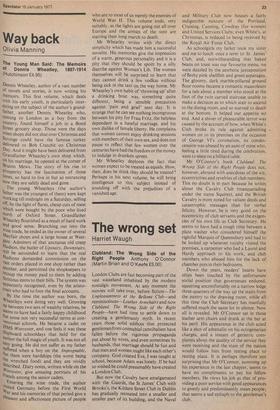The wrong set
Harriet Waugh
Clubland: The Wrong Side of the Right People Anthony O'Connor (Martin Brian and O'Keefe 0.00)
London Clubs are fast becoming part of the vast wasteland inhabited by the modern nostalgic movement. At any moment the movies will take over, before fictionŌĆöThe Unpleasantness at the Bellona ClubŌĆöand reminiscencesŌĆöLeather Armchairs and now Club/and: The Wrong Side of the Right PeopleŌĆöhave had time to settle down to creating a gentlemanly myth. In recent years those solid edifices that protected gentlemen from connubial cannibalism have fallen before the vigorous propaganda put about by wives, and even sometimes by husbands, that marriage should be fun and that men and women might like each other's company. God created Eve, I was taught at school, because Adam was lonely. If he had so wished he could presumably have created a London Club.
But now the Cavalry have amalgamated with the Guards, the St James' Club with Brooks's, the Kildare Street Club in Dublin has gradually retreated into a smaller and smaller part of its building, and the Naval and Military Club now houses a fairly indigestible mixture of the Portland, Cruising, Canning, Cowdray (for women) and United Services Clubs; even White's, at Christmas, is reduced to being received by the Royal Air Force Club.
As schoolgirls my father took my sister and me to lunch once a term to St. James' Club, and, notwithstanding that baked beans on toast was our favourite menu, we were dazzled by the aesthetic juxtaposition of fleshy pink shellfish and green asparagus. The gloomy, dark marble-pillared ground floor rooms became a romantic mausoleum for a tale about a member who stood at the foot of the twin curved staircase unable to make a decision as to which stair to ascend to the dining room, and so starved to death at the bottom. It helped our appetite no end. And a shiver of pleasurable terror was caused by the account of how, when White's Club broke its rule against admitting women on to its premises on the occasion of George VE's coronation, its condescension was abused by an aunt of mine who, feeling a little tired during the Celebration, went to sleep on a billiard table.
Mr O'Connor's book Club/and: The Wrong Side of the Right People does not, however, abound with anecdotes of the wit, eccentricities and revelries of club members. This no doubt is in part because he writes about the Cavalry Club (masquerading under the name Squires), and the British Cavalry is more noted for valiant deeds and catastrophic messages than for verbal felicity. However, he is very good on the eccentricity of club servants and the exigencies of his own life as Club Secretary. He seems to have had a rough time between a plate washer who considered himself the rightful Marquis of Queensbury and had to be locked up whenever royalty visited the premises, a carpenter who had a Laurel and Hardy approach to his work, and club members who abused him for the lack of chamber pots in their bedrooms.
Down the years, readers' hearts have often been touched by the unfortunate social position that governesses endured, squatting uncomfortably on a narrow ledge three-quarters of the way up the stairs from the pantry to the drawing room, while all this time the. Club Secretary has manfully suffered much the same lot in silence. Now all is revealed. Mr O'Connor sat in those leather arm chairs and drank at the bar at
his peril. His appearance in the club acted like a shot of adrenalin on his octogenarian charges, and a stream of geriatric com plaints about the quality of the service they Were receiving and the state of the nation would follow him from resting place to resting place. It is perhaps therefore not surprising that Mr O'Connor, summing up his experience in the last chapter, seems to have no compliments to pay his fellow members. He views his job as that of providing a poor service with good appearances to greedy and predominantly mean people; that seems a sad epitaph to the gentleman's club.


































 Previous page
Previous page